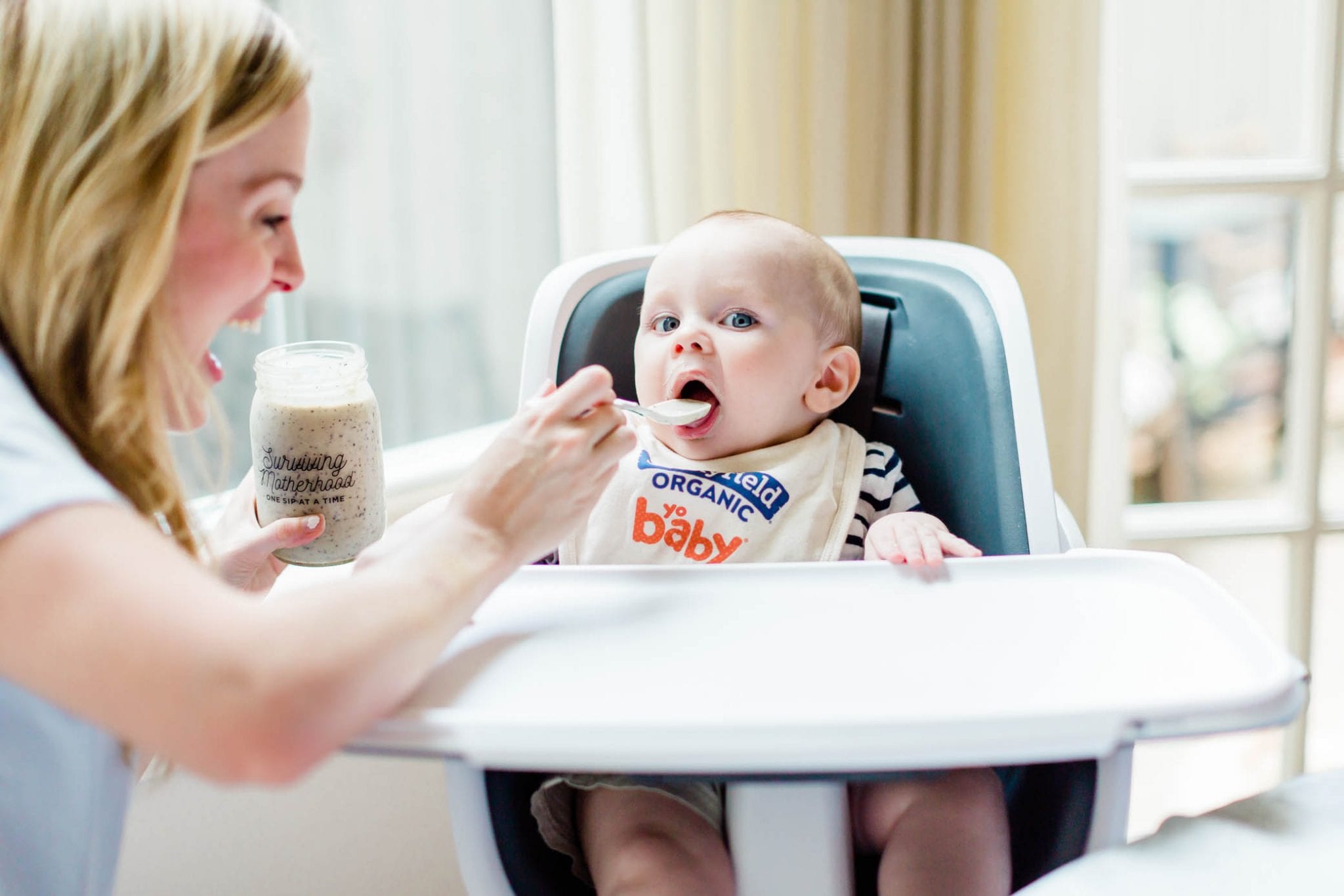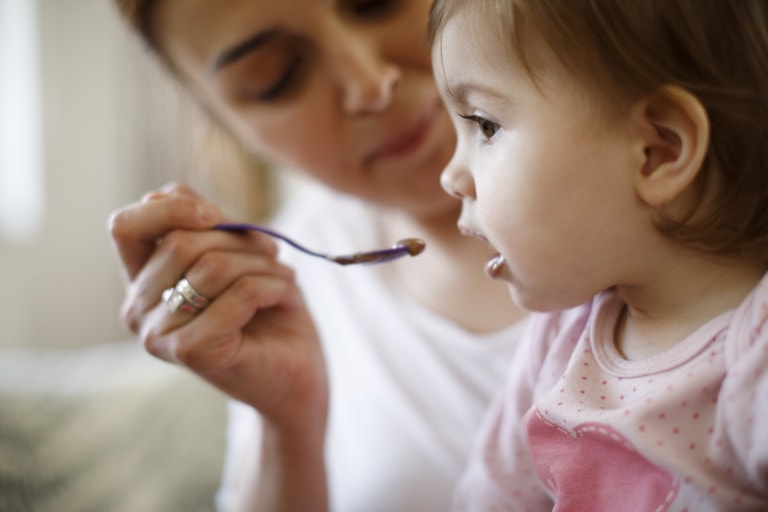Food allergies in babies are something that many parents worry about. Not only are they scary, but they can make introducing solids challenging. Food allergies in babies can also go undiagnosed for quite some time, leaving you confused about what may be leading to the symptoms your baby is experiencing.
While some babies may be at a higher risk of developing food allergies due to family history, some babies may have no greater risk at all and still experience an allergic reaction to certain foods.
In this article, we will explore how to know if your baby is allergic to certain foods and some of the most allergenic and the least allergenic foods for babies. We will also talk about food allergy testing and some steps you can take if your baby suffers from food allergies.
Is My Baby Allergic to Certain Foods?
So, maybe you have been suspecting a food allergy due to certain symptoms your little one is experiencing. Many mommas just have a gut feeling when something isn’t settling well with their child. For some moms, the first indication of a food allergy starts in infancy. If your baby is breastfed and experiences reflux, eczema, blood in their stools, or fussy behavior, there’s the potential for an underlying cow’s milk allergy if dairy is part of the mom’s diet. The dairy can pass through breast milk and cause allergic symptoms in a baby with a cow’s milk allergy.
Other babies don’t develop symptoms until moms start introducing solid foods.1 Again, gastrointestinal symptoms can arise, as can fussiness and irritability, eczema, and even some life-threatening reactions like anaphylaxis shock. There’s also a condition called FPIES which stands for Food protein-induced enterocolitis syndrome, which is a rare but severe food allergy that affects the gastrointestinal system. An FPIES reaction can cause intense vomiting, diarrhea, and even shock.
If your baby is experiencing any of these serious and potentially life-threatening allergic symptoms, it is crucial to get immediate medical attention and then follow up with a pediatric allergist to help identify the exact food or foods causing these symptoms.
Some other commonly seen symptoms of food allergies in babies include:8
- Coughing
- Wheezing
- Difficulty breathing
- Swelling or itching of the lips, tongue, or mouth
- Itching or tightness in the throat
- Eczema
- Hives
Introducing Solid Foods to Babies with Food Allergies
If you suspect your baby suffers from food allergies or your baby has already been diagnosed, introducing foods can be challenging. However, working with a pediatric allergist can help you develop a safe plan for solid food introduction. It may also help to know the least allergenic foods for babies as these foods are less likely to trigger an allergic reaction. However, keep in mind that every baby is different, and a baby can be allergic to any food, whether it’s on this list or not! This is especially true for babies suffering from FPIES, so always speak with your doctor first.2
Keep reading because we will take a look at some of the least allergenic foods and the most allergenic foods in babies.
Understanding Allergies in Babies
Before we jump into the foods you will want to watch out for, there are some surprising statistics about infant food allergies that are important for every parent to know about. According to the Food Allergy Research and Education organization, 1 in 13 children have food allergies, and 30% of them are allergic to more than one food.3
Food allergies in children are also skyrocketing. The CDC has estimated that food allergies in children have jumped up by 50% from the years 1997-2011.4 That’s a massive jump and something we need to be paying more attention to.
Many parents also wonder if their babies will outgrow their allergies. While many pediatricians tell parents that babies generally outgrow allergies to milk, the FARE (Food Allergy Research & Education) states that allergies to milk, eggs, wheat, and soy are generally resolved in childhood.5 Still, children are starting to outgrow these allergies at a much slower rate than what had previously been documented. This means that many children over the age of five have still not outgrown these allergies. Allergies to foods like peanuts, tree nuts, fish, and shellfish are generally not outgrown, and the child will likely have an allergy to these foods lifelong.
Another interesting area of research has shown that the season your baby is born may also play a role in their risk of developing a food allergy. Interestingly enough, a study found that babies born in Boston in the fall or the winter were more likely to have food allergies.6 So, what does this have to do with? It was hypothesized that this likely had to do with low UVB exposure and not enough vitamin D. This one study concluded that changes in exposure to sunlight and vitamin D might play a role in the development of childhood food allergies.6 Interesting, right?
Least Allergenic Foods for Babies
Now that we know a little more about food allergies in babies, let’s take a look at some of the least allergenic foods for babies. According to Dr. Sears, some of these foods include apples, avocados, broccoli, peaches, carrots, asparagus squash, sweet potatoes, rice, oats, chicken, turkey, lamb.7
Apples
Homemade applesauce is often the very first food for babies. It is full of vitamin C and naturally sweet, so babies tend to love it! You can try using different varieties of apples to introduce new flavors. Homemade applesauce is also great for mixing with other fruits as well such as mangos and peaches.
Peaches
Another great fruit to start with are peaches. They are very sweet and can easily be made into a purée. They are also high in vitamin E, K, folate, and potassium.
Avocados
Avocados are another great first food. They are very high in monounsaturated healthy fats, rich in magnesium and fiber, and can be mashed for babies. Babies generally enjoy the mild flavor.
Broccoli
Broccoli makes for a great first veggie. You can purée broccoli with some chicken broth for added flavor to provide your little one with fiber, folic acid, vitamin K, and C.
Carrots
Carrots are often a go-to veggie for parents. They have a mild but sweet flavor that most babies enjoy. Carrots can be puréed for little babies and then steamed and served with chicken or turkey for older babies ready for finger foods. They are rich in beta-carotene, fiber, vitamin K, and potassium.
Squash
Butternut squash is a delicious vegetable to introduce your baby to. It makes a yummy purée and is packed full of fiber and vitamin B6.
Sweet Potatoes
If your baby likes butternut squash, they will likely enjoy sweet potato too. Sweet potatoes are rich in calcium, selenium, and B-vitamins making them an excellent addition to your little one’s diet.
Rice & Oats
Many parents start with rice or baby oat cereal when starting solids. They are often fortified with iron and folic acid, but rice and oats are great additions in their whole and natural state when baby is older. Rolled oats mixed with banana and molasses is a great breakfast option for an added fiber and iron boost, and rice served with a protein like chicken or turkey also makes for a well-balanced meal for older babies who are ready for more solid foods.
Proteins
Chicken, turkey, and lamb are generally considered to be low-allergenic foods for babies. If tolerated, these proteins can be alternated in your baby’s diet and served with a veggie and carbohydrate for a balanced meal.
Most Allergenic Foods for Babies
While some foods are generally well-tolerated, a handful of foods are commonly known to trigger allergic reactions. According to Dr. Sears, some of the most allergenic foods for babies include:7
- Peanuts
- Nuts
- Coconut
- Eggs & egg whites
- Dairy
- Soy
- Wheat
- Shellfish
- Yeast
- Citrus fruits
- Corn
- Peas
- Tomatoes
- Pork
- Mustard
- Cinnamon
- Chocolate
- Berries
- Buckwheat
If your child suffers from food allergies, it may be best to avoid these foods until you work with an allergist to determine a plan to avoid introducing foods your child may react to.
What to Do If You Suspect a Food Allergy
So, what do you do if you suspect your baby has a food allergy? First, you will want to avoid that food. Do not introduce the suspicious food or any other highly allergenic foods to your baby’s diet until you speak with your pediatrician.
There are also specific food allergy tests a pediatric allergist can perform to really pinpoint what foods are causing issues. These tests include a skin prick test which is often combined with blood work.
While baby food allergies are very scary, working with the right medical team and knowing exactly what foods to avoid can help make the transition to introducing solid foods a little less stressful.




















